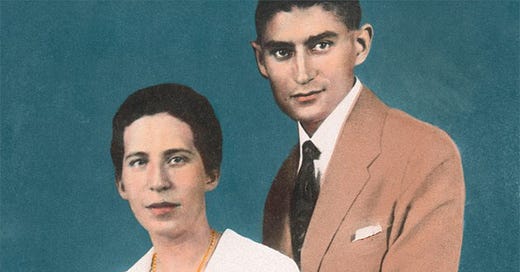[To Felice’s father, Herr Carl Bauer]
Dear Herr Bauer,
Now that I have extracted from you your two kind letters, I don’t know whether you will have the patience and the desire to listen to what follows. But I do know that I have to say it. I would have to say it even if your letters had not inspired me with the confidence I now have in you.
What I told you in my first letter about my relationship with your daughter is true, and will remain so. But apart from one allusion which may have escaped your notice, something decisive was missing. Perhaps you thought there was no need to comment on it, because you believe that coming to grips with my character is entirely your daughter’s affair and had already been achieved. This is not so. At times I used to think that it had, but again and again it turned out that it had not happened, and could not happen. I have deluded your daughter with my letters; as a rule I have not meant to deceive her (although sometimes I have, because I loved her, and love her, and have been terribly aware of our incompatibility), and perhaps by doing just this, I blinded her. I really don’t know.
You know your own daughter: she is a gay, healthy, self-confident girl, who in order to live should be surrounded by gay, healthy, and lively people. You know me only from my visit (I was about to add that this should be enough), and I cannot repeat what I have told your daughter about myself in some 500 letters. But please consider this one important fact: my whole being is directed toward literature; I have followed this direction unswervingly until my 30th year, and the moment I abandon it I cease to live. Everything I am, and am not, is a result of this. I am taciturn, unsociable, morose, selfish, a hypochondriac, and actually in poor health. Fundamentally I deplore none of this: it is the earthly reflection of a higher necessity. (What I am really capable of is not the problem here, and has no connection with it.) I live within my family, among the kindest, most affectionate people—and am more strange than a stranger. In recent years I have spoken hardly more than twenty words a day to my mother, and I exchange little more than a daily greeting with my father. To my married sisters and brothers-in-law I do not speak at all, although I have nothing against them. I lack all sense of family life.
And is your daughter, whose healthy nature has destined her for a happy married life, to live with this kind of man? Is she to tolerate a monastic existence with a person who, though he loves her as he can never love anyone else, spends most of his time in his room or wandering about by himself—simply because of his irrevocable vocation? Is she to tolerate a life utterly divorced from her parents, her family, and almost any other social contact—because I, who would lock my door against my best friend, cannot imagine any other kind of married life? Could she stand this? And what for? For my writing, which is highly problematic in her eyes and perhaps even in mine? And for this she is to live alone in a foreign town, in a marriage that may turn out to be a relationship of love and friendship rather than a real marriage?
I have said the minimum of what I intended to say. Above all: I want to make no excuses for myself. On our own, your daughter and I could find no solution: I love her too much, and she cannot see me as I am. And perhaps she wants the impossible only out of compassion, no matter how much she may deny it. Well, now we are three. You be the judge!
Very sincerely yours, Dr. F. Kafka


